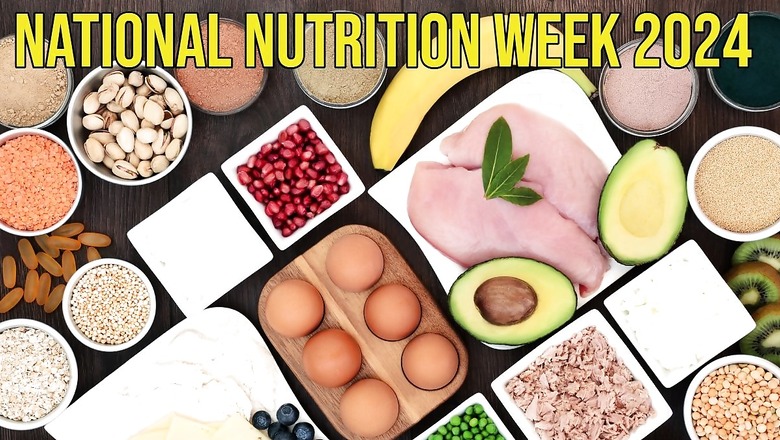
views
Nutrition has always been a much-discussed topic in India. With diverse cultures that come with their own cuisines, the ‘daily diet’ of many Indians looks very different from one another. In fact, according to a recent survey conducted by Haleon, makers of Centrum, on India’s health with over 2000+ respondents, 52% of those surveyed said they believe their daily diet is enough for their nutritional needs. Despite this, the same survey also revealed that all respondents were actively managing at least 4 health concerns across, energy, immunity, bone health and digestive health. Additionally, although these health concerns are prevalent, the survey also showed that only 4% of urban Indians supplement their diet with health supplements like multivitamins daily.
The recent dietary guidelines released by the Indian Council for Medical Research (ICMR), NIN, 2024 too, have sparked a nationwide conversation about our daily nutritional needs. Most of the B Vitamins and vitamin C are heat sensitive and may easily get degraded by heat, because of which food might not retain its nutritive value to meet your daily nutritional requirements. These guidelines prompt us to reevaluate our food habits and emphasize the understanding what we consume. However, understanding daily nutrition requirement is not complicated. This National Nutrition Week, Dr. Atul Sharma, Medical and Scientific Affairs – Wellness, Haleon ISC, delves into it, through the lens of Recommended Dietary Allowance (RDA).
What is RDA?
For basic understanding, Recommended Dietary Allowance or RDA in simple words, is daily requirement of various nutrients such as vitamins and minerals that our body needs to stay healthy. RDA are defined keeping age, gender, lifestyle, etc. in mind. It maps the required dosages of macronutrients (Protein, Carbohydrates and Fats) and micronutrients (Vitamins and Minerals) that are required by our body in specified quantities to stay active and healthy.
Is our Daily Full Plate Nutritionally Sufficient?
A full plate does not necessarily mean it is adequate on nutrition. According to recent data, micronutrient intakes of 70% of the Indian population are less than 50% of the RDA requirements . The recently released guidelines by ICMR-NIN showed that the intake of fruits and vegetables is extremely low amongst Indians, with people merely eating 100g to 200g of vegetables and fruits per day while the recommendation is 500g per day. Basis reports from the National Institute of Nutrition (NIN), which operates under the ICMR, approximately 56.4% of diseases in India are attributed to unhealthy dietary habits.
How to meet your RDA as per your body’s requirement:
While food provides nutrients, it may not be enough to meet your individual RDA requirements, which vary based on age, gender, and other factors. Here are some tips to ensure you are getting the full nutrition your body needs every day:c
- Consume a balanced dietEat wholesome and varied foods to ensure a balanced diet. Aim for a rainbow-diet full of fruits and vegetables, whole grains, lean proteins, and dairy or dairy alternatives. Take salt and sugar in limited amount and avoid highly processed foods as part of your diet.
- Use the right cooking and pre-cooking methodsProper food preparation helps retain healthy nutrients. To minimize vitamin and mineral loss, minimize washing vegetables. The ICMR recommends steaming vegetables and using closed-lid cooking methods to help preserve nutrients. Soaking, sprouting, popping, and puffing also enhance nutrient availability in grains and legumes.
- Supplement your daily diet with multivitaminsWhile some vitamins and minerals are readily available in our diet, others may not be. For individuals with specific diet preferences such as vegan, vegetarian diet can find difficulty in fulfilling the recommended intake of certain vitamins and minerals like iron, vitamin B12, etc. through just food or natural mediums, which is where multivitamins come into play. Multivitamins can help in meeting the daily RDA as advised by filling the nutritional gaps that may exist in our daily diet. One can choose the right multivitamin to consume basis their age, gender and individual nutritional requirements.
RDA serves as a guiding hand that helps you understand your body’s nutritional demands and assists you in making informed dietary choices. It’s not about being a stickler for rule-based eating but using it as benchmark to build your own nutritional optimum. By managing your nutritional needs with care, confidence, and comfort, you can use RDA to stay healthy and happy.
With the right balance of quality and quantity, and the necessary supplementation when needed, achieving optimal health is within everyone’s reach.
















Comments
0 comment